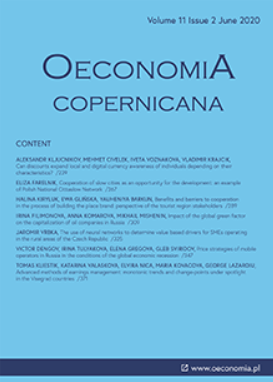Random walks and market efficiency tests: evidence on US, Chinese and European capital markets within the context of the global Covid-19 pandemic
Random walks and market efficiency tests: evidence on US, Chinese and European capital markets within the context of the global Covid-19 pandemic
Author(s): Rui Dias, Nuno Teixeira, Veronika Machová, Pedro Pardal, Jakub Horák, Marek VochozkaSubject(s): Supranational / Global Economy, Health and medicine and law, Financial Markets
Published by: Instytut Badań Gospodarczych
Keywords: COVID-19; capital market; random walk hypothesis; efficient market hypothesis; arbitration; portfolio diversification;
Summary/Abstract: Research background: Covid-19 has affected the global economy and has had an inevitable impact on capital markets. In the week of February 24–28, 2020, stock markets crashed. The index FTSE 100 decreased 13%, while the indices DJIA and S&P 500 fell 11–12%, the biggest drop since the 2007–2008 financial and economic crisis. It is therefore of interest to test the random walk hypothesis in developed capital markets, European and also non-European, in order to understand the different predictabilities between them. Purpose of the article: The aim is to analyze capital market efficiency, in its weak form, through the stock market indices of Belgium (index BEL 20), France (index CAC 40), Germany (index DAX 30), USA (index DOW JONES), Greece (index FTSE Athex 20), Spain (index IBEX 35), Ireland (index ISEQ), Portugal (index PSI 20) and China (index SSE) for the period from December 2019 to May 2020. Methods: Panel unit root tests of Breitung (2000), Levin et al. (2002) and Hadri (2002) were used to assess the time series stationarity. The test of Clemente et al. (1998) is used to detect structural breaks. The tests for the random walk hypothesis follows the variance ratio methodology proposed by Lo and MacKinlay (1988). Findings & Value added: In general, we found mixed confirmation about the EMH (efficient market hypothesis). Taking into account the conclusions of the rank variance test, the random walk hypothesis was rejected in the case of stock indices: Dow Jones, SSE and PSI 20, partially rejected in the case indices: BEL 20, CAC 40, FTSTE Athex 20 and DEX 30, but accepted for indices: IBEX 35 and ISEQ. The results also show that prices do not fully reflect the information available and that changes in prices are not independent and identically distributed. This situation has consequences for investors, since some returns can be expected, creating opportunities for arbitrage and for abnormal returns, contrary to the assumptions of random walk and information efficiency.
Journal: Oeconomia Copernicana
- Issue Year: 11/2020
- Issue No: 4
- Page Range: 585-608
- Page Count: 24
- Language: English

